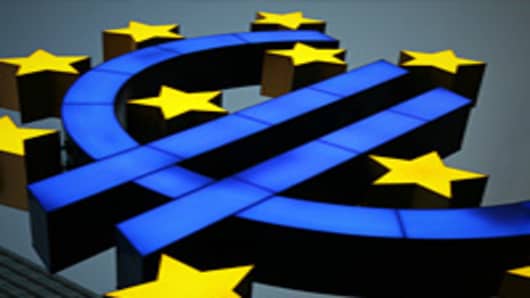A month-long rally for stocks and a European Union deal on its debt crisis have lifted investors' mood, but at least one economist is amazed at the reaction to Europe’s latest attempt to solve its sovereign debt woes.
“To listen to what they say, EU leaders – at an all-night summit last Wednesday 'increased' the size of their bailout fund to 1 trillion euros without putting a dime of real money on the table,” said Carl Weinberg, chief economist at High Frequency Economics, in a research note on Monday.
With the head of the European Financial Stability Fund (EFSF) touring the world in an attempt to sell the deal to major sovereign wealth funds, Weinberg questioned why anyone would want to buy into what he believes is a “crazy” scheme.
“Now they (EU Leaders) are keen to tap into resources that are not their own to fund this crazy scheme of guarantees, leveraged off guarantees to sell bonds and bank shares that no one may want to buy, (in order) to restore value in the banking system destroyed by other bonds that no one wants to own right now. This is a construct of Madoffian proportions,” said Weinberg.
China, Japan and the International Monetary Fund have all been discussed as possible sources of funding for the EU scheme, but Weinberg believes emerging nations do not want to start paying for rich countries trying to avert economic decline.
“Our view is that unfunded guarantees are worthless. Raising resources to fund the EFSF and the associated SIV will require diverting savings – domestic European savings, for the most part, not Chinese savings, and not those kept on reserve at the IMF – from either domestic consumption or investment,” he said.
Raising that money within the next year from European savers will have a major effect on jobs and incomes as output and demand drop sharply, according to Weinberg, who believes that Europe will be back in crisis sooner rather than later.
“We predict a catastrophic contraction of GDP in Euroland in a combined monetary and real-economy event," he said. "The event we envision is much more akin to the Great Depression of the 1930’s than to any business cycle we have experienced in our lifetimes.”
The equity market clearly thinks differently, as it prepares for the last trading day of the best month for stocks in nearly 40 years. Weinberg, though, believes traders are mistaking the emergence of a structure for an EU deal for the actual funding and implementation of that structure.
“We saw a similar market rally in the aftermath of the July 21st summit, which was also billed as a complete and final solution to the crisis," he said.
“As people come back from this weekend’s reflections, we expect many to draw the same conclusions we have: Unfunded rescue plans are futile, and funding the programs as envisioned will break the back of the Euroland economy,” Weinberg said.



